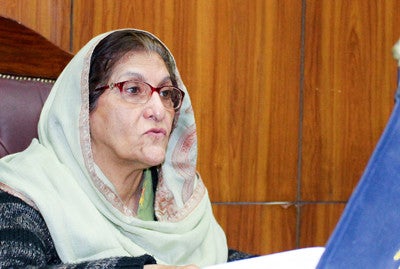Interview with H.E. Dr. Meher Taj Roghani, Deputy Speaker of the Provincial Assembly, Khyber Pakhtunkhwa, Pakistan
Date:
Author: Faria Salman
The Honorable Dr. Meher Taj Roghani has been elected as the first female Deputy Speaker of the Khyber Pakhtunkhwa Provincial Assembly on 22 December 2015, a milestone in the Provinces electoral history. In her address H.E. Dr. Meher Taj Roghani pledged to ensure equality and empowerment for all women and girls saying: “This Country owes debt to girls and women for their resilience.”
With your new appointment, as a female role model for democracy, could you tell us something about your childhood?

I was born in a village in Mardan District, Khyber Pakhtunkhwa. We are five brothers and one sister, and I being the eldest and only sister. I lived in a very small village but luckily we had a primary school. When my male cousins, at least one year older to me, were admitted to school, I also wanted to go to school. The moment I saw them with school bags I would start crying and this would go on for hours. I was the first girl ever to be granted admission in my local school, and also the first student accepted under the age of five.
After my secondary education I wished to stay at home but it was my father who persuaded me to pursue my medical career.
After completing my ‘house job’ I moved to London with my husband (who with my father continued to be my biggest supporters) and specialized in pediatrics.
What has been your motivation to enter politics?
On returning to Pakistan, I secured jobs at the Lady Reading Teaching Hospital, the Khyber Medical College and the Khyber Teaching Hospital where I established the first pediatrics preventive ward. While working as a Professor at the Khyber Medical College I was appointed Minister for Health, but I still had no intention of joining main stream politics.
Looking back I guess my motivation must have been my ancestral association with politics as well as my own interaction with politicians. From a very early age I saw my elders do things for others; this played a pivotal role for me and instilled a passion to work for the positivity of others.
I took the decision to enter politics after my retirement. I joined the Pakistan Tehreek-e-Insaf (commonly known as PTI) as a Provincial Convener back in 2011. I was not allowed to take part in any inter-party elections yet I was nominated as a Member of the Provincial Assembly of Khyber Pakhtunkhwa. Following this I appointed Special Advisor to the Chief Minister of Khyber Pakhtunkhwa on Social Welfare and Women’s Empowerment.
What would you say is key to improve women’s representation in decision-making and public participation?
For me women’s representation in any area can only be improved through education and skills development coupled with opportunities made available for their participation and leadership. To me education plus skill and opportunity are like two scissor blades - with any of the blades missing we cannot achieve the desired results. We can also say that provision of opportunities is directly proportional to the political will by all parties.
Is it difficult working in a male-dominated field/region? What are the obstacles and challenges, if any? How did you overcome these?
Well there are many difficulties - ironically we have ‘retarded’. In the 1970’s when I was studying I used to travel alone between Peshawar and Lahore, and whilst working I used to drive alone after my late-night rounds.
As the first qualified pediatrician of my province with full support from my family, I suffered from mistrust by most of my male colleagues. Over the years the situation instead of improving has deteriorated which to my belief is due to the wrong interpretation of cultural values and religion. It can only be overcome through advocacy by people who are well versed in culture and religion, which will convince the masses that equality is the basis of Islam and Pukhtoonwali (the Pukhtoon Code of Conduct).
We also need to bring forward positive role models and provide them with an opportunity to interact with the younger generation. The traditional mechanisms for interaction between the sexes and across the different age groups have vanished; we need to find an alternative for it.
What are you looking forward to in 2016 and beyond?
Despite the fact that Khyber Pakhtunkhwa is undergoing a complex emergency, I remain positive.
The government’s resolve is to prioritize education for all. I look forward to witnessing a bigger increase in local women’s leadership and their participation and empowerment in all fields of life. We have already seen increased participation of the women parliamentarians in parliamentary affairs which is a very positive sign.
What do you see as the biggest challenges ahead to make ‘Planet 50-50 a reality by 2030?
The biggest challenge is political commitment from across all the parties to provide and ensure the required recognition, skills and opportunities are provided to our women, one half of the 50 per cent.
What one message would you give to women and girls who want to accomplish something?
My one message is for women and girls to go out and acquire education and skills with dedication and persistency.
For more information contact:
Faria Salman
Strategic Management and Partnerships Officer & Communications Focal Point for
UN Women Pakistan
Email: [ Click to reveal ]